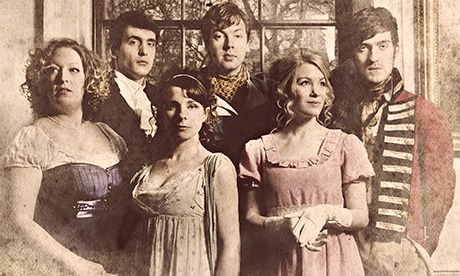 Third time to the Nuffield in a week, second viewing of this production in a week, second Jacobean tragedy in a day (what is ... happening ... to me?) - on Tuesday I went down the M3 yet again to see 'Tis Pity She's a Whore by John Ford, production by Cheek by Jowl (who are probably better known in the modern theatre world than Ford). C by J founder Declan Donnellan's The Actor and the Target is a bible for modern actors, and it is always instructive to see a production which follows such a carefully-thought-through attention to a text, with acting technique rather than directorial concept the centre of gravity.
Third time to the Nuffield in a week, second viewing of this production in a week, second Jacobean tragedy in a day (what is ... happening ... to me?) - on Tuesday I went down the M3 yet again to see 'Tis Pity She's a Whore by John Ford, production by Cheek by Jowl (who are probably better known in the modern theatre world than Ford). C by J founder Declan Donnellan's The Actor and the Target is a bible for modern actors, and it is always instructive to see a production which follows such a carefully-thought-through attention to a text, with acting technique rather than directorial concept the centre of gravity.This version of 'Tis Pity updates to modern dress, with Anabella a contemporary teenage girl and her bedroom the single setting for the action - not so very different from the bare Jacobean stage where time and space equally collapse into a single platform and the audience are similarly required to 'see' the different settings of the action. Second time around, I noticed the attention to detail in the room: red cd player, red lampshade, red book cover .. Exciting opening choreography, creating a sense of a girl both empowered and controlled by the surrounding male culture. It's easy to get this sort of thing wrong and start with clever staging, but this production had clearly started with deep thought about the language and characters and worked outwards from there.
Every detail of staging had a reason for being there, and though some speeches were given a modern twist (Hippolita's offer of herself in marriage to Vasques becomes a full-on seduction scene, Soranzo's already horrible beating becomes something unspeakable) it was never twisted out of credibility and the business brought out the nastiness that seeps from between the lines of Ford's writing. Easy, too, for frantically inventive staging to become a distraction from the core action and speech, but only once - Hippolita at the party - did the interpretation take over from the text for me (it took the second viewing to figure out how all the things going on fitted together), suggesting a certain lack of interest in the niceties of remitting breach of betrothal in the seventeenth-century and a desire to give us something busy to look at instead.
Notes. Plenty of circular movement, inevitable when a bed is plonked in the middle of the stage, and devastating deployment of the bathroom offstage. Effective use of onstage singing, an object lesson in juxtaposition (eg something atrocious happening against soft music offstage). Speech hard to discern over the music at times, Friar and Cardinal looked out of place as the Catholic context of the original doesn't belong in the secular hedonistic world of this interpretation (how many students these day go around with a tutor Friar in tow?). There should be some kind of quota on how many tops can be ripped off enthusiastically in the space of two hours, as there was a diminishing return in the constant revelation of torsos. Will Alexander a terrifying Vasques, honey-voiced and brutal; Orlando James and Eve Ponsonby convincing throughout as the doomed brother and sister. Overall impression one of excitement at the spectacle, a creeping sense that, yes, these people are really psychopathically sick, and an overpowering atmosphere of corruption - all in the Jacobean spirit. Or part of it: this production of a not-frequently-performed play omitted entirely the comic subplot and made other cuts, most oddly to the ending - so we were listening to a symphony with sections of the orchestra missing. But what it set out to do it achieved wonderfully well: it yanked this piece out of its cosy heritage habitat and made the material visceral, shocking and affecting to a contemporary audience using the full resources of its company. Hit the target, one might say.







